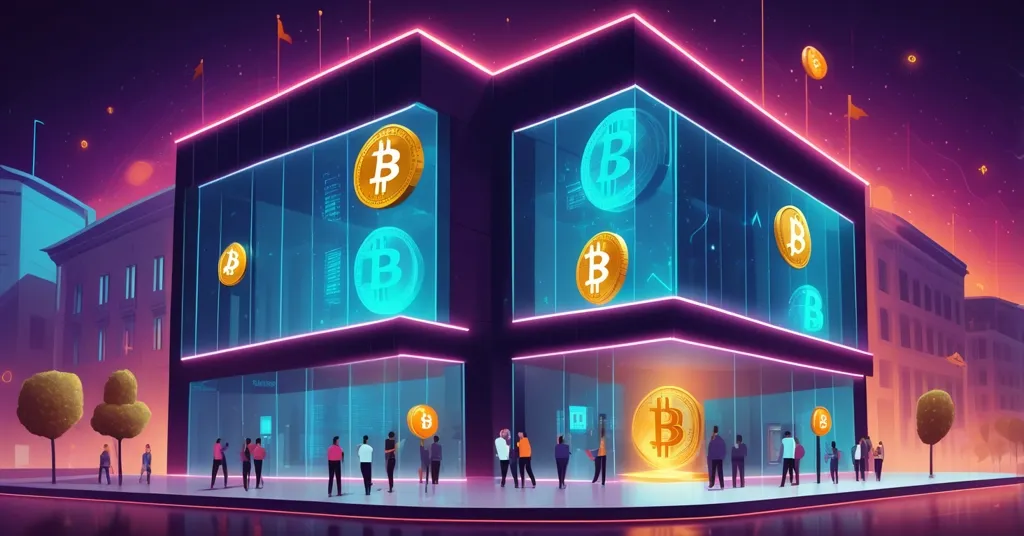BBVA Launches Crypto Trading for Spanish Retail Investors with Bitcoin and Ether

BBVA Pioneers Crypto Trading and Custody for Spanish Retail Investors
BBVA, one of Spain’s heavyweight financial institutions, has made a groundbreaking move by launching cryptocurrency trading and custody services for retail customers. Through the familiar interface of its mobile app, Spaniards can now buy, sell, and store Bitcoin and Ether, marking a significant step as traditional banking collides with the disruptive force of decentralized finance. Backed by the EU’s regulatory framework, this rollout is both a nod to growing demand and a test of how well old-school finance can adapt to the blockchain era.
- BBVA’s Bold Step: Retail investors in Spain can trade and store Bitcoin and Ether directly via the BBVA mobile app.
- Regulatory Support: Services comply with the EU’s Markets in Crypto-Assets (MiCA) framework for investor protection.
- Hands-Off Approach: BBVA offers no investment advice, leaving customers fully responsible for their crypto decisions.
What’s on Offer: BBVA’s Crypto Gateway for Spaniards
Imagine buying Bitcoin as easily as sending a payment through your banking app. BBVA has turned that into reality for its retail customers in Spain. The multinational bank, known as Banco Bilbao Vizcaya Argentaria, recently announced the rollout of these services following disclosure to Spain’s National Securities Market Commission (CNMV). With this launch, everyday users can engage with Bitcoin—often called “digital gold” for its role as a decentralized store of value—and Ether, the native currency of Ethereum, a blockchain powering smart contracts and decentralized applications (dApps) that enable everything from lending to NFT marketplaces. BBVA’s decision to focus on these two giants of the crypto world reflects a cautious yet calculated entry into a notoriously volatile space.
What makes this stand out from the myriad of crypto exchanges already crowding the market? It’s all about trust and simplicity. As Gonzalo Rodríguez, Head of Retail Banking for Spain at BBVA, emphasized:
“We want to make it easier for our retail customers in Spain to invest in crypto-assets, through a simple and easy-to-access digital solution on their cell phone. Our goal is to support them as they explore digital assets, backed by the strength and security of a bank like BBVA.”
Unlike standalone platforms where users often wrestle with complex wallet setups or live in constant fear of hacks, BBVA offers both trading and custody services. Custody, in this context, means the bank holds the private keys to your crypto—think of it as them safeguarding your digital cash the way they’d hold your fiat in a savings account. This contrasts with self-custody, where you control your own keys and bear full responsibility for security, embodying the “be your own bank” ethos of crypto. BBVA’s custodial model sacrifices some of that sovereignty for convenience, a trade-off that might appeal to newcomers but raise eyebrows among purists who value total control.
Spain’s Crypto Appetite: Why Now?
BBVA isn’t just banking on a whim—Spain’s hunger for digital assets is undeniable. According to a 2024 European Central Bank survey, 9% of Spaniards now own cryptocurrency, a figure that’s doubled since 2022, putting Spain on par with France and Croatia, though trailing behind Slovenia (15%) and Greece (14%). Chainalysis data further paints a vibrant picture, with Spain receiving over $80 billion in cryptocurrency inflows between 2023 and 2024. That’s not pocket change; it’s a clear signal of a market ripe for mainstream solutions like BBVA’s crypto trading services for retail customers.
But it’s not all sunshine and HODL memes. Spain’s tax regime on crypto is a harsh wake-up call for the unprepared. Capital gains on crypto profits exceeding €6,000 are taxed at rates ranging from 19% to 28%, a hefty chunk that could dampen enthusiasm for casual traders. Since BBVA explicitly avoids providing investment advice, you’re on your own to navigate these financial landmines. If you’re new to this and dreaming of quick riches, consider this your reality check—don’t expect the bank to hold your hand when the taxman comes knocking or when Bitcoin takes a nosedive.
MiCA: Guardrails or Roadblocks for Crypto in the EU?
Underpinning BBVA’s venture is the EU’s Markets in Crypto-Assets (MiCA) regulation, a comprehensive framework designed to tame the unregulated jungle of crypto by setting standards akin to traditional finance. Think of MiCA as a driver’s license for crypto companies—it mandates licensing for firms, enforces anti-money laundering (AML) checks, and requires transparency on risks to protect investors. BBVA’s alignment with these rules isn’t just a formality; it’s a stamp of legitimacy that could sway skeptics who’ve long viewed crypto as a shady back-alley deal. For a bank with BBVA’s reputation, this compliance with MiCA regulations builds confidence, especially in a space scarred by scams and collapses.
Francisco Maroto, Head of Blockchain and Digital Assets at BBVA, has underscored the bank’s broader evolution, pointing to growth not just in crypto but also in stablecoins—digital currencies pegged to assets like the US dollar for stability—and tokenized traditional investments like bonds and funds. These tokenized assets are essentially digital versions of real-world holdings, recorded on a blockchain for faster, cheaper transactions. This vision positions BBVA as a bridge between the dusty ledgers of TradFi (traditional finance) and the cutting-edge potential of DeFi (decentralized finance).
But let’s pump the brakes on the applause. Not everyone views MiCA as a golden ticket. Industry critics, such as Alessandro Palombo, have slammed it as potentially “Europe’s biggest mistake since the dotcom era,” warning that overly tight rules could drive innovation—and billions in capital—out of the EU. With reports of over $499 billion in crypto flowing through Eastern Europe alone, there’s a real fear that regulation might strangle the very disruption we celebrate. Small startups, for instance, could buckle under compliance costs that giants like BBVA can easily absorb. So, while MiCA offers guardrails for investors, is it also building roadblocks to the EU’s leadership in this financial revolution? That’s a tension BBVA navigates with every trade, as discussed in platforms like Q&A forums on MiCA’s impact.
BBVA’s Crypto Journey: A Global Playbook
This isn’t BBVA’s first rodeo with digital assets. Back in 2021, they pioneered crypto services in Switzerland, initially targeting high-net-worth clients with portfolio allocations of 3-7% in digital assets as “manageable risk exposure,” according to Philippe Meyer, Head of Digital and Blockchain Solutions at BBVA Switzerland. There, offerings later expanded to include stablecoins like USDC alongside Bitcoin and Ether for institutional clients. In 2023, BBVA’s Turkish arm, Garanti BBVA, entered the fray, catering to a wider range of altcoins like Solana, XRP, and AVAX. Spain’s focus on retail investors with just the two major cryptocurrencies shows a tailored strategy—prioritizing mass adoption over niche diversity. It’s a smart play, but it leaves room to wonder if stablecoins might eventually arrive in Spain as a hedge against volatility. For now, don’t count on it; BBVA is keeping things lean, as detailed in their 2025 rollout plans for crypto trading in Spain.
Spain itself is becoming a battleground for crypto adoption among financial heavyweights. Competitors like Banco Santander and Caixabank are sniffing around digital assets, while the National Commission for the Promotion of Digital Investments notes over eight institutions awaiting approval as virtual asset service providers. BBVA holds a crucial edge—they’re the first to fully integrate crypto into their app without leaning on third-party platforms, a move that could lure curious investors seeking a seamless experience. Yet, with 95% of EU banks still on the sidelines due to conservative stances from bodies like the European Securities and Markets Authority (ESMA), BBVA’s gamble is as audacious as it gets, especially when compared to crypto adoption trends among Spanish banks.
Decentralization vs. Banking DNA: A Double-Edged Sword
Let’s cut to the chase—traditional banks diving into crypto is both a massive win and a glaring contradiction. On one hand, BBVA’s move could turbocharge adoption, bringing Bitcoin and blockchain tech to the masses through a trusted name. This aligns with the spirit of effective accelerationism—pushing disruptive tech forward at full throttle. On the other hand, it risks diluting the core ethos of decentralization. Banks, by their very nature, are gatekeepers wired for control and oversight. Can we truly expect them to champion the freedom and privacy that Bitcoin was built to protect? Their custodial role, while convenient, means they hold your keys—hardly the “not your keys, not your crypto” mantra we preach. It’s TradFi wearing a crypto mask, not pure sovereignty, a debate often explored in community discussions on BBVA’s crypto approach.
Consider this hypothetical: What if a financial crisis hits and governments pressure banks like BBVA to freeze crypto accounts, much like we’ve seen with fiat funds during past economic meltdowns? Are we swapping one set of chains for another, trading central bank oversight for corporate control? BBVA’s no-advice policy does nod to personal responsibility, echoing crypto’s DIY ethos, but their involvement still smells of centralization to hardcore decentralists. As Bitcoin maximalists, we see BTC as the untainted expression of decentralized money—fixed supply, no central figure, pure peer-to-peer power. Ethereum and its smart contract wizardry fill a different niche, driving DeFi innovation that Bitcoin shouldn’t (and doesn’t need to) touch. BBVA sticking to these two for now is a rare show of restraint in a space littered with overhyped trash tokens.
What Spanish Investors Need to Know Before Trading
Beyond taxes, there are practical risks to weigh before jumping in with BBVA. Market volatility is the obvious beast—Bitcoin and Ether can swing wildly, as seen in crashes like the 2022 Terra collapse that wiped out billions. Easy app access might tempt impulsive trades, especially for rookies with no guidance from the bank. Then there’s the custodial concern: if BBVA’s systems go down during a market frenzy—a common gripe with centralized platforms—you could be locked out of trades at the worst moment. Compare this to self-custody, where you’d face no such gatekeeper, though you’d need to secure your own keys against loss or theft. It’s a choice between ease and autonomy.
BBVA’s broader blockchain ambitions also deserve a closer look. Their work with stablecoins and tokenized assets in other markets hints at a future where Spain might see digital versions of bonds or real estate trades on the app. This could bridge TradFi and DeFi, making finance faster and cheaper, but from a Bitcoin purist lens, it risks tying crypto’s freedom to the same old gatekeepers we aimed to escape. Innovation? Sure. Liberation? That’s debatable.
Key Takeaways and Questions for Crypto Enthusiasts
- What does BBVA’s crypto launch mean for retail investors in Spain?
It provides a secure, user-friendly way to trade and store Bitcoin and Ether via a trusted banking app, lowering barriers to entry, though investors must handle risks and taxes independently. - Is the MiCA framework a help or hindrance to crypto in the EU?
It helps by offering investor protection and boosting institutional trust, as seen with BBVA, but critics warn it could stifle innovation and drive capital out of the region with excessive compliance burdens. - Can traditional banks like BBVA align with crypto’s decentralized ideals?
Only partially—their push for adoption is undeniable, but custodial control and regulatory ties clash with the privacy and freedom that define blockchain’s purpose. - Why limit the offering to Bitcoin and Ether for now?
It’s a strategic choice to build trust with proven assets and minimize volatility exposure, though future additions like stablecoins could cater to broader needs for stability. - How will competition among Spanish banks influence crypto adoption?
Rivalry with Banco Santander and Caixabank could spur innovation and accessibility, but there’s a risk of prioritizing profit over user empowerment if decentralization takes a backseat.
BBVA’s foray into crypto trading and custody marks a pivotal moment for Spain, testing the waters of how traditional finance can coexist with the raw, disruptive energy of blockchain. It’s far from flawless—taxes bite, regulation walks a tightrope, and the specter of centralization looms large—but it’s a stride toward a world where decentralized money isn’t just for cypherpunks and tech wizards. As Bitcoin advocates, we salute the focus on BTC as the cornerstone of this shift, while recognizing Ethereum’s complementary role in pushing DeFi forward. The real victory here is choice, handed to millions of Spaniards through a familiar app. Whether they use it to join the revolution or chase fleeting scams is the trillion-dollar puzzle we’re all solving.



